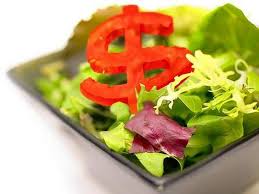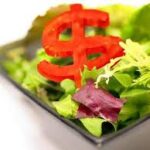By Nancy Mehlert, MS
It’s not uncommon to hear new patients say “Eating real whole food sure is more expensive!” But is it really? Here is a list of ways to reassess how you spend your hard earned dollars and how to save money, eat well and live well in the New Year. Happy New Year Everyone!
First Take a Good Assessment – It’s often an eye opener when you get a good handle on what you’re truly spending on your food. Often we are only considering the grocery bill. But have you totaled up eating out in restaurants, ordering delivery, quick purchases of food or snacks, or accounted for every bottle of water, or tea or coffee you purchase on the run? You may be surprised how much all of that adds up. When you get an eye on that number you may discover you have plenty of food dollars and that it’s just a matter of how you allocate it.
Eat at Home More Often – Consider the “total cost” to your health and pocketbook when eating out. You drive there, order more food than the human body needs, eat more damaged fat, chemicals, salt, MSG and sugar than the human body needs, pay a significant mark up from grocery store retail costs, add a 15-20% tip, and then drive home again. Even a drive-through can expensive relative to grocery store purchases. For example, at the cheapest place in town, McDonalds currently sells their fake food Big Mac Meal for $5.99. So consider feeding 2 adults basically for $12.00 at McDonalds. Beyond the pure lack of nutrition and well over 100 ingredients in it, you could go to the grocery store and purchase a pound of grass fed beef, 2 sweet potatoes and a bag of fresh shredded cabbage for the same amount of money, feed 3-4 people and eat a nutritiously dense meal at home, prepared in less than 20 minutes. And in every way, you would be healthier for it.
Prepare and Pack Food & Drink for the Road – Even a bottle of water in a convenience store generally runs well over one dollar. Coffee, though once free in many places, starts at $1.00 or more. These small but frequent pit stops add up. Everyone with good health as a goal will find a good cooler with a cold freezer pack, a good coffee mug, a non-toxic water bottle, and other cost saving devices. Those investments will pay for themselves in no time. Besides, you will save time, money and gasoline by no longer waiting, idling your car in line, breathing the fumes and paying the price both in health and your pocket book. A little planning and preparation at home every week goes a long way in preserving time, money and health. When you discover all the benefits you may even have time to plant a few of your own sprouts, herbs, or vegetables. And that is a saver too!
Not Everything Needs to Be Organic – In an ideal world, with limitless funds, perhaps this would be nice but sometimes you just have to pick your battles! Organic fresh fruits and vegetables can be expensive. If you can’t find organic options in your price range, at least learn which ones are most likely heavily pesticided or genetically modified so that you can avoid those. This is especially important for staples such as apples, celery, spinach, cucumbers, bell peppers, and kale for example. Take a look at the Environmental Working Group’s recommendations at http://www.ewg.org/foodnews/summary/ for what to avoid and what is clean. You may also find frozen organic options that are better priced than fresh. If organic meats are not available or in your price range, consider “all natural” choices where at least the antibiotics and hormones have not been given to the animal. Or check into local sources, bulk purchases online or locally which, per pound, often yield a better price than grocery store options. Consider splitting bulk orders with friends.
Shop for Price – You will find considerable price variations from store to store and online. For staple items, such as coconut oil, grass fed meats, nut flours, unprocessed sea salt, and expeller pressed oils for example, you may gain cost savings by purchasing larger quantities at online places such as Amazon.com. Costco does a fair job of carrying some healthy choices. Consider splitting the cost of membership and the food with another family who also wants to be healthier. Shop for sales, especially with items that can be kept in the freezer for storage and use later, such as meats and nut flours. Your local farmers’ markets may offer better prices on seasonal choices.
Eat for Nutrient Density – Once you add up the cost of processed snack foods, processed pre-packaged meals, desserts, junk food and drinks, you will be surprised how expensive they are and yet how hungry they leave you (and unhealthy!). When you choose to eat real whole food, dense in quality nutrition, you will discover you are satiated and satisfied, therefore needing fewer snacks or meals. Additionally, when you move from the sadly mistaken low fat, no fat, no cholesterol dietary recommendations and ensure adequate healthy fats in your diet, you will quickly discover that you need less volume. Add in high fiber vegetables, nuts and seeds and you will be full. It also reduces the need or desire to eat larger portions of meat (6-8 ounce or more). We need meat, but it is not necessary to eat it at every meal and in most cases smaller portions in the 2-5 ounce range can suffice if your diet choices are otherwise broad in variety and whole food choices. That makes a pound of meat go much further. Items such as organic beans and lentils can generally be found in the bulk section at a very reasonable price.
Avoid Expensive Gimmick Health Foods – Being well and eating well is a fast growing industry. There are plenty of people capitalizing on your interest to eat better. I’m always on the lookout for the healthiest foods we can incorporate into our diets but remain alert and skeptical. Most of the newest “super” foods are very expensive for the nutrition gained. Many new, seemingly good, choices really aren’t when you read the fine print, ingredients lists and sources. You are likely much better off focusing on a good long term eating plan that includes real, clean, whole food and plenty of variety rather than purchasing acai and goji berries or mangosteen beverages at a high price. Kombucha and Coconut Waters can be expensive and sugar laden.
Every time you cook, make extra – this is essential for those who want to eat healthier and is an easy task. Even if you aren’t a leftover fan, the reality is that if you store them immediately into travel containers, you are ready to put together a to-go lunch box the next day without extra effort. Try mixing and matching and using leftovers creatively. For example, steam beets for dinner, then use leftover beet slices to add to a salad the next day. Or use leftover broccoli, cauliflower or Brussels sprouts for a stir fry with frozen wild caught shrimp the next night. Planning seems cumbersome at first, but the more you do it, the easier it becomes. Practice establishes a new habit.
Making Nutrition Important – finally, everyone in the world has a certain amount of money with which to make lifestyle choices, some of us more, some of us less. Where we put our money is a reflection of what is important to us. Your food choices, planning time on your calendar, and knowledge about your food choices will all be dependent on how important these are to you. I confess, my resources are rather limited, but nutrition is very high on my list. That means I have had to forgo some other things in life so that I can stay healthy, eat right and feel good. Those sacrifices have been well worth it to me. But these are very personal decisions that only you can make for yourself. I have also learned that if I eat well, I don’t have to take as many supplements, rarely need to pay for medical expenses, over the counter drugs or prescriptions, rarely miss work, and have come face to face with how poorly I used to feel when I ate fast, processed food. I have a friend on food stamps and we have hammered out a way for her to eat healthfully on very limited resources. I believe it’s possible for almost everyone to make small, meaningful changes in their diet for better health and it doesn’t have to break the bank.
If you need help planning, practicing, or need ideas to save money and/or prepare easy meals, schedule a consultation with me in the grocery store or at our facility. Start out the New Year with intentional steps to making lifestyle changes for you and your family’s health. Practice makes eating easy, cost effective, and healthy!



